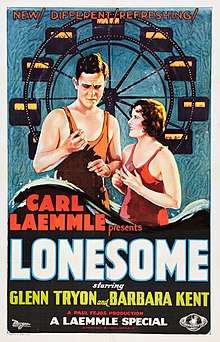Lonesome
Lonesome is a 1928 American comedy drama part-talkie film by the Hungarian-born American director Paul Fejös. It was produced and distributed by Universal Pictures. In 2010, it was selected for preservation in the United States National Film Registry by the Library of Congress as being "culturally, historically, or aesthetically significant".[1][2] The film was released on Blu-ray disc and DVD on August 28, 2012, as part of the Criterion Collection.[3]
| Lonesome | |
|---|---|
 Theatrical release poster | |
| Directed by | Paul Fejös |
| Produced by | Carl Laemmle Carl Laemmle Jr. Oskar Schubert-Stevens |
| Story by | Mann Page |
| Starring | Barbara Kent Glenn Tryon Fay Holderness |
| Cinematography | Gilbert Warrenton |
| Edited by | Frank Atkinson |
| Distributed by | Universal Pictures |
Release date |
|
Running time | 69 min (silent version) 75 min (sound version) |
| Country | United States |
| Language | English |
It was remade in 1935 as a comedy called The Affair of Susan.
Plot
In New York, Mary is a telephone operator who lives alone and is lonely. Jim is a factory worker who lives alone and is lonely. Each decides to go to the beach (presumably Coney Island) and both are captivated with each other, eventually realizing, moreover, that they really do like each other. Having gone from loneliness to finding love, enjoying the company of each other and having fun, they are separated, because of exigent circumstances and hundreds of visitors to the beach that day. Only knowing each other's first name, and having only a small photo of each other, Jim and Mary are desperate to find each other. Will these two lonesome individuals who have discovered their love for each other lose it all the same day?
Cast
- Barbara Kent as Mary
- Glenn Tryon as Jim
- Fay Holderness as Overdressed Woman on Roller Coaster
- Gustav Partos as Romantic Gentleman on Roller Coaster
- Eddie Phillips as the Sportive Gentleman on Bus
- Andy Devine as Jim's Friend
- Edgar Dearing as Cop (uncredited)
- Louise Emmons as Telephone Caller (uncredited)
- Fred Esmelton as Swami (uncredited)
- Jack Raymond as Barker (uncredited)
- Churchill Ross as Telephone Caller (uncredited)
Production
Lonesome was one of the first motion pictures to have sound and a couple of talking scenes. It was released in both silent and monaural versions.[4] Some scenes in existing original prints of the film are colored with stencils.
Home media
In 2012, The Criterion Collection released Lonesome on DVD and Blu-ray, with Fejos' 1929 films Broadway and The Last Performance as extra features.[5]
References
- "2010 National Film Registry Announced: News Releases". Library of Congress. December 28, 2010.
- "Complete National Film Registry Listing | Film Registry | National Film Preservation Board | Programs at the Library of Congress | Library of Congress". Library of Congress, Washington, D.C. 20540 USA. Retrieved 2020-05-04.
- "Lonesome (1928)". Criterion Collection.
- "Alternate Versions for Lonesome (1928)". imdb.com.
- "Lonesome". The Criterion Collection. Retrieved 2018-04-25.
External links
| Wikimedia Commons has media related to Lonesome. |
- Lonesome essay by Raquel Stecher on the National Film Registry website
- Lonesome on IMDb
- Lonesome at AllMovie
- Still at The Hollywood Revue
- Stills at silentsaregolden.com
- Lonesome: Great City, Great Solitude an essay by Phillip Lopate at the Criterion Collection
- Lonesome essay by Daniel Eagan In America's Film Legacy, 2009-2010: A Viewer's Guide To The 50 Landmark Movies Added To The National Film Registry In 2009-10, Bloomsbury Publishing Usa, 2011, ISBN 1441120025 Pages 31-34